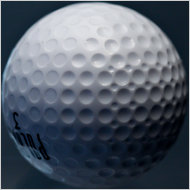by Bill Pennington
Ducks quack, dogs bark, cab drivers honk and golfers slice. Among the basic truths of the planet: 80 percent of golfers cannot hit their tee shots where they aim.
But what if there were a golf ball that went only straight?
“That would be a miracle,” Dion Cooper, 26, of Brooklyn, said as he swatted balls last week at the Edgewater Golf Range in northern New Jersey.
Mr. Cooper was hitting his driver toward the Manhattan skyline, the balls tailing off in the familiar arc of the classic golf slice. Then he was handed the new Polara golf ball and took a healthy swat.
“Straight as an arrow,” he yelped with a mix of awe and surprise. For the next five minutes, he rarely hit a ball crooked.
A golf ball that won’t slice? It sounds like an old joke: guy invents a ball that won’t sink in water hazards, then loses it in the woods. It sounds too good to be true, sacrilege to the golf ethos of eternal struggle.
Or, as Mr. Cooper asked, “Is this magic?”
It is physics, not magic, but there is, of course, a catch. The Polara ball has an irregular dimple pattern that means it does not conform to golf’s official rules. The ball, which is designed to reduce slices and hooks by 75 percent or more, would be illegal to use in the Masters, for example, or any other competition, local or otherwise, sanctioned by the United States Golf Association.
But as golf works to appeal to a younger generation that hits the links in cargo shorts and sandals and without a rulebook, does a nonconforming label still matter?
Read more:
Ducks quack, dogs bark, cab drivers honk and golfers slice. Among the basic truths of the planet: 80 percent of golfers cannot hit their tee shots where they aim.
But what if there were a golf ball that went only straight?
“That would be a miracle,” Dion Cooper, 26, of Brooklyn, said as he swatted balls last week at the Edgewater Golf Range in northern New Jersey.
Mr. Cooper was hitting his driver toward the Manhattan skyline, the balls tailing off in the familiar arc of the classic golf slice. Then he was handed the new Polara golf ball and took a healthy swat.
“Straight as an arrow,” he yelped with a mix of awe and surprise. For the next five minutes, he rarely hit a ball crooked.
A golf ball that won’t slice? It sounds like an old joke: guy invents a ball that won’t sink in water hazards, then loses it in the woods. It sounds too good to be true, sacrilege to the golf ethos of eternal struggle.
Or, as Mr. Cooper asked, “Is this magic?”
It is physics, not magic, but there is, of course, a catch. The Polara ball has an irregular dimple pattern that means it does not conform to golf’s official rules. The ball, which is designed to reduce slices and hooks by 75 percent or more, would be illegal to use in the Masters, for example, or any other competition, local or otherwise, sanctioned by the United States Golf Association.
But as golf works to appeal to a younger generation that hits the links in cargo shorts and sandals and without a rulebook, does a nonconforming label still matter?
Read more:
